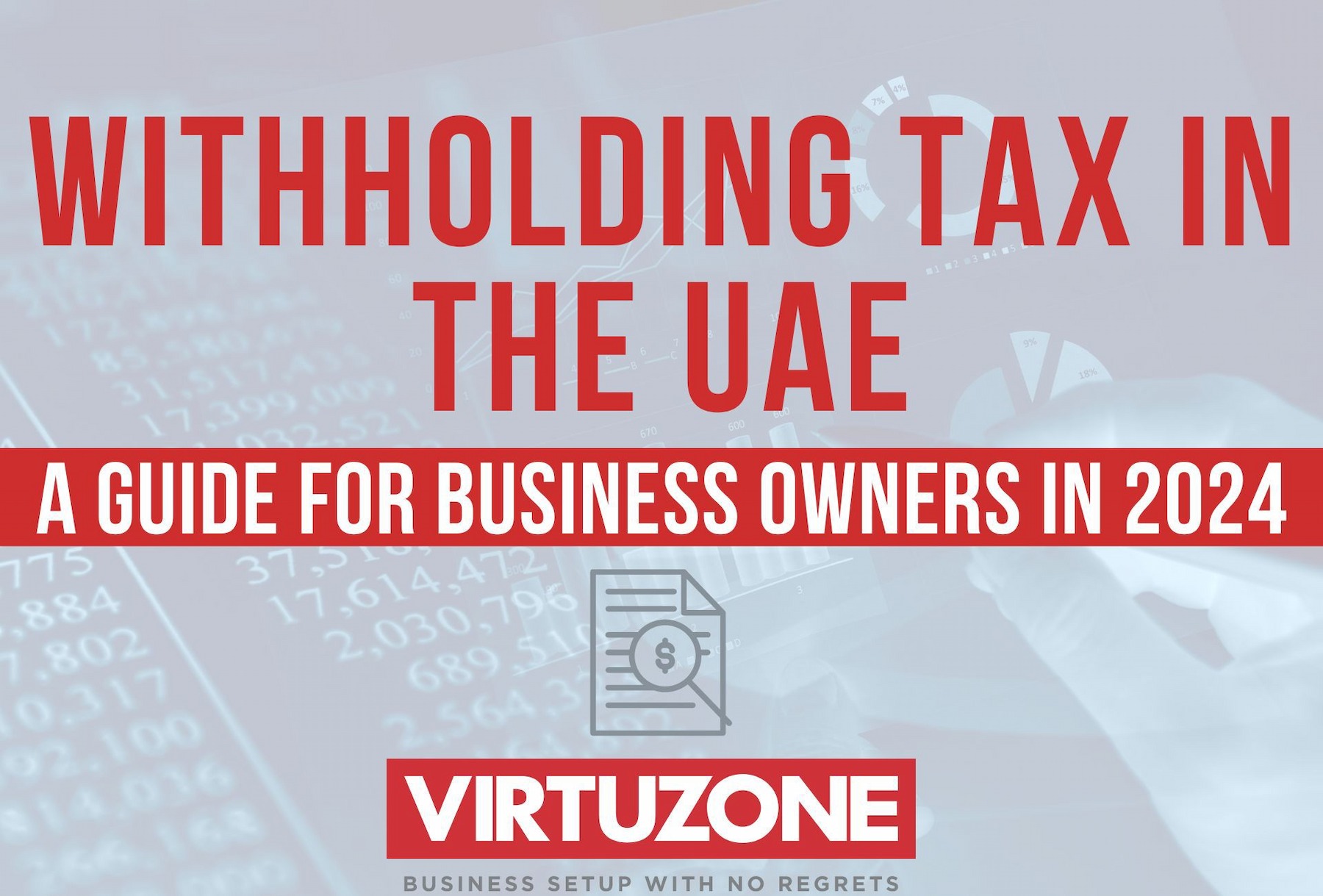As an entrepreneur or business owner in the UAE, understanding the nuances of withholding tax within the broader context of corporate taxation is crucial for maintaining compliance with the nation’s evolving tax regulations. In December 2022, the UAE Federal Tax Authority took a significant step by issuing a decree that outlines the specifics of withholding tax requirements under the United Arab Emirates’ corporate tax framework.
This comprehensive guide is designed to demystify corporate taxes, focusing on withholding tax—exploring the latest legislation and its implications for your business operations in the UAE. Whether you’re navigating tax liabilities or seeking to optimize your tax strategy, this article aims to provide valuable insights and answer any queries regarding the current corporate tax landscape, including the pivotal aspect of withholding tax.
What Is Withholding Tax in the UAE?
Withholding tax is an amount of money an employer or business entity pays as income taxes on behalf of its employees or contractors. This amount is typically deducted at the source of the income (hence, it is ‘withheld’). The amount withheld is a credit against the income taxes the employee must pay during the year. The amount withheld is a credit against the income taxes the employee or contractor must pay during the year. If an excess amount of money is withheld from your income over the course of the year, you will be eligible for a tax refund. Conversely, if insufficient funds are withheld, you will likely owe the IRS upon filing your tax return.
Tax regulations and rates differ from nation to nation, and collection methods vary. Generally, taxes are withheld globally at 15-25%. Most tax systems levy a withholding tax on dividends, interest payments, and royalties. This is a common practice worldwide as it ensures that the government receives its fair share of revenue on time.

[virtuzone_banner id=latest-offer]
Implications of Withholding Tax Rules To UAE Businesses
On the 9th of December, 2022, The Ministry of Finance (MoF), above the Federal Tax Authority (FTA), released Federal Decree-Law No. 47, which legislates the current rules on corporate tax (CT) and withholding tax guidelines in the UAE. As per the update, withholding tax is held at a rate of 0%. The changes made to this federal decree have been applicable since June 1, 2023, and relates to all financial years thereafter.
Income Sources Eligible For 0% Withholding Tax
Currently, 0% withholding tax in the UAE applies to these different income types:
- Income earned by a foreign company sourced in the UAE and not attributed to its Permanent Establishment (PE) based in the country;
- Mainland-sourced income benefitting from the Free Zone’s 0% corporate tax regime but not coming through an onshore branch; and
- Dividends or other profit distributions beneficially issued by a Free Zone Person are subject to zero taxation on mainland shareholders within it. For example, if a DMCC company distributes dividends to someone residing in the JAFZA free zone, they will be eligible for zero per cent (0%) withholding tax.
Withholding Tax Versus Value-Added Tax (VAT)
Though some have confused the two, withholding tax is separate from Value Added Tax (VAT). The UAE implemented a 5% VAT rate in 2018, while withholding tax was introduced much earlier.
VAT is a tax charged on the sale of goods and services in the UAE. Consumers pay it when they purchase goods and services, but businesses also collect it from their customers. In this way, businesses act as agents for the government to collect taxes from buyers. All businesses registered for VAT must charge it on all applicable sales and submit the information to the government.
Therefore, although VAT and withholding tax are different types of taxes that serve separate functions, both are important for businesses and other non-residents operating within the UAE. They help the government collect taxes more effectively and can also provide peace of mind for business owners to stay compliant with all their tax obligations.

Corporate Tax in the UAE
The Corporate Tax Law has revolutionised the UAE’s taxation system, making it one of the most progressive tax systems in the world. It also significantly impacts how companies do business here. All United Arab Emirates businesses and commercial activities will be subject to corporate tax. However, many exceptions apply to this rule, including those industries involved in natural resource extraction, which are still bound by emirate-level taxation. Further information on corporate tax for businesses and individuals is outlined below.
Who Must Pay Corporate Tax?
Under UAE Tax Law, ‘taxable persons‘ as it applies to corporate tax can be defined as:
- UAE companies and any other corporate entities established and managed within the UAE.
- Individuals engaging in business or commercial activities within the UAE, as outlined in a forthcoming Cabinet Decision, will be subject to specific regulations.
- Foreign legal entities with a Permanent Establishment in the UAE (referred to as non-resident juridical persons).
Who is Exempt From Paying Corporate Tax?
Specific business sectors or organizations are granted exemption from Corporate Tax due to their significant role and contribution to the UAE’s societal structure and economic landscape. These entities are recognized as Exempt Persons and encompass:
- Government bodies.
- Extractive businesses and non-extractive natural resource businesses are all subject to specific regulations.
- Qualifying public benefit entities, as outlined in Article 9 of the CT Law.
- Pension and Social Security funds, whether public or private.
- Qualifying investment funds, as stipulated in Article 10 of the CT Law.
- A wholly-owned UAE subsidiary of a governing organisation, government entity, qualifying investment fund, or public/private pension/social security as per Article 18 of the CT Law.
- Free zone persons who meet certain conditions in Article 18.
Exempt Income Types
When calculating taxable income, the following expenses are exempt:
- Dividends and other distributions earned from a resident person or foreign holdings.
- Participating interests, as stated in Article 23 of the CT Law.
- Income derived by non-resident persons for operating aircrafts or ships during international transport that meets conditions outlined in Article 25 of the CT Law.
- Any revenue generated from a permanent foreign establishment according to Article 24 of CT law.
Corporate Tax Rate in the UAE
Companies and other commercial entities must pay a corporate tax on their net income, with the amount determined as follows:
-
- The government has set a 0% tax rate on business profits up to AED 375,000. This is to help support small businesses and start-ups.
- Companies are liable to a 9% tax on profits in excess of AED 375,000 starting from their first financial year. All companies have been subjected to this rate since June 1st, 2023.
[virtuzone_banner id=cost-calculator]
Advantages of Withholding Tax
By implementing withholding tax rules, governments can collect taxes more accurately and quickly – an essential aspect of any nation’s financial stability. Here are some more advantages of withholding tax as it applies to almost all countries.
- Ensures compliance with local laws and regulations, thus protecting businesses from costly fines or penalties.
- Ensures foreign individuals can operate within the UAE’s borders while still being held accountable for their income and associated taxes.
- Prevents the risk of double taxation and allows the government to efficiently monitor and collect taxes from non-resident individuals who may have difficulty paying what they owe.
- Combats tax evasion while generating additional government revenue.
- Withholding taxes are often used in place of income taxes, thus offering more flexibility for businesses in terms of tax payments.
- Can be used as an incentive for employees by allowing companies to deduct withholding taxes from employee salaries and reward them with additional benefits such as bonuses or additional vacation time.

The Benefits of Operating a Business in the UAE
The advantages of running a business in the United Arab Emirates are numerous and compelling, especially compared to the global landscape. The UAE stands out as a beacon of economic growth and business-friendly policies, primarily through its efforts to foster a vibrant pro-business culture coupled with an exceptionally favourable tax regime.
The introduction of a low corporate tax rate, coupled with specific exemptions for certain types of businesses and organizations, underscores the nation’s commitment to attracting entrepreneurs and companies from around the globe. These tax incentives reduce the financial burden on businesses and enhance profitability and reinvestment opportunities, making the UAE an even more appealing business destination.
Furthermore, the strategic geographical position of the UAE serves as a gateway connecting the markets of Europe, Africa, and Asia, offering unparalleled access to international trade routes and global markets. This unique advantage is complemented by the UAE’s world-class infrastructure, including state-of-the-art transportation, logistics, and telecommunications facilities, which collectively facilitate seamless business operations and global connectivity.
Additionally, the UAE’s legal framework is designed to protect the interests of foreign investors, offering them security and confidence in their investments. The country’s stable political environment and progressive regulatory policies further enhance its attractiveness as a business hub. This combination of benefits significantly contributes to the UAE’s reputation as a leading global business destination, where the low corporate tax rates and targeted exemptions play a pivotal role in its economic allure, driving growth, innovation, and diversification in its economic landscape.
[virtuzone_banner id=setup-guide]
Get Expert Guidance For Your Business With Virtuzone
The United Arab Emirates is dedicated to helping businesses thrive and grow. The UAE government provides numerous resources and initiatives that support entrepreneurs in achieving success. With its robust economy, the UAE offers an ideal environment for expanding your business ventures.
It is important for current and future business owners to stay informed on corporate tax law changes, including the withholding tax rules. This will ensure your business is always compliant with the latest regulations. If you have any questions regarding withholding tax rules in the UAE, please reach out to one of our experienced, qualified accounting professionals.
Setting up your Dubai business and ensuring you meet your tax obligations has never been easier with the help of consultants at Virtuzone. Our experts can guide you through all phases of your business, including business set-up, registration, finding a location, licence acquisitions, account opening and establishing yourself in a free trade zone.
Need help securing a UAE tax residency certificate? We can help with that, too. Contact us today for advice or assistance on your business needs.
[virtuzone_banner id=free-consultation]
FAQ’s
What is withholding tax?
Withholding tax is a type of income tax that the government collects from employees and other individuals who receive payments such as salaries, wages, commissions, dividends, interest or royalties. It’s typically withheld from salaries at the source of payment before it has been paid to the recipient. The amount withheld depends on what the individual earns, how much tax is required and what exemptions are available.
Is there a withholding tax in the UAE?
Businesses in the UAE do not incur withholding taxes since their corporate income and profits are subject to a 0% rate. However, it’s important to get clear advice from a corporate tax consultant or accountant for specific details on exemptions that apply to your business.
What are the compliance requirements for withholding tax?
As per current advice from the Federal Tax Authority, UAE-sourced income paid to non-residents may be eligible for a 0% withholding tax rate. As a result, no taxes would need to be withheld. Furthermore, UAE businesses or foreign recipients are not obligated to file related paperwork or reports. To keep up with compliance regulations, contact our specialist team of accountants to provide further guidance for your business.
How is withholding tax calculated?
Non-residents without a permanent presence in the UAE who receive no UAE-derived revenue related to their establishment may be exempt from withholding tax. Tax withholding is often the standard for any cross-border payment, including dividends, royalty payments, and interests. UAE resident persons are exempt from withholding tax for all transactions between them.
What Income Types Incur Withholding Tax?
In the UAE, withholding tax affects payments made to non-residents for services rendered or work performed within the country. This includes income from royalty fees and professional technical service fees such as management, consulting, legal advice, and engineering services. In addition, any dividends paid to non-residents are also subject to withholding tax. The rate of tax applied to non-residents changes yearly and is usually between 5% – 20%.
What Taxes are Paid in the UAE?
The UAE has no personal income tax, with most taxes paid by businesses. A few more indirect taxes could be imposed on companies, such as withholding tax and Value Added Tax (VAT), which are currently set at 5% for goods and services for businesses.
There is also an excise tax on tobacco products and carbonated beverages of 100%. Additionally, several other taxes are associated with certain activities, such as property and asset transfer taxes, taxes on oil and gas companies and customs duties.
What Is a Qualifying Free Zone Person under UAE Corporate Tax Law?
Qualifying free zone persons are eligible for 0% corporate tax on a qualifying income basis. If you meet the conditions outlined by Article 18 of the Corporate Tax Law, you then qualify as a free zone person.









